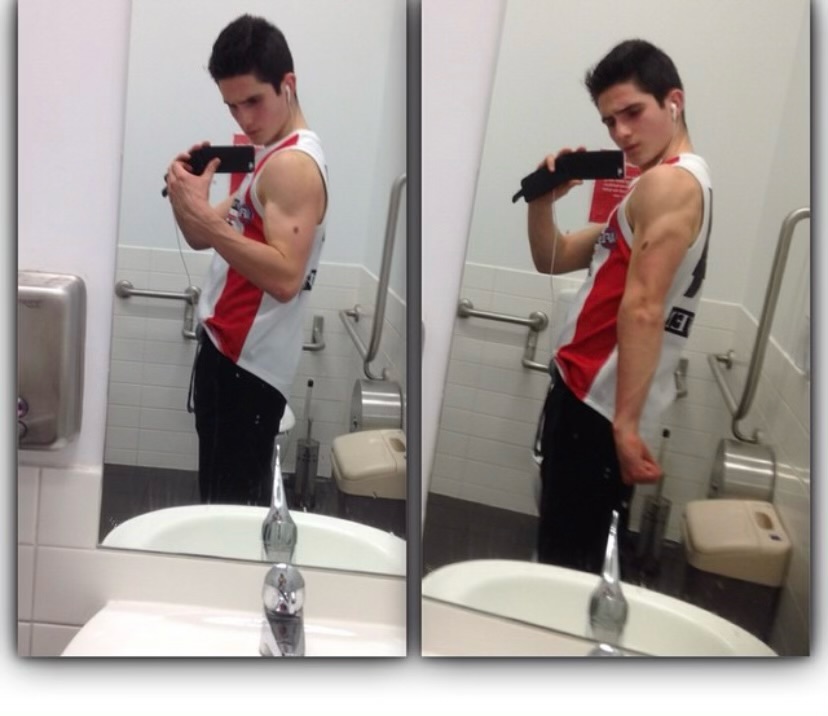Warning: The following story contains discussions around body image struggles and eating disorders.
When you speak with Alex Rodriguez, a nutrition-science student who regularly works out at his local gym in Melbourne’s inner-north, there’s no way of knowing body image struggles once forced him to spend a Christmas in hospital fighting to stay alive.
His teen years had been marred by heartache, a combination of his parent’s divorce and breaking up with his girlfriend. Following a rigorous workout regimen had seemed like the only reasonable way of managing his emotions at the time.
“I gripped onto fitness and became obsessed with running every single day and doing as much as I possibly could,” says the 23-year-old. “It was working. But because of my obsessive nature, it was never enough, and I did more and more and more.
“Progressively, I began to eat less and less and less.”
Within six months, Mr Rodriguez was called out of his high school classroom and taken to a nearby hospital. His weight had spiralled down so much he couldn’t muster the energy to walk short distances, and his knees had become too weak to handle running.
“The doctors told me in the emergency ward I had a few more days to live. They said, ‘It’s lucky that you made it here’.”

Concerned professionals have been pressuring the Federal Government and its medicines regulator, the Therapeutic Goods Administration, to crack down on supplement safety for more than a decade. Photo: Supplied.
National data collated by the eating disorder organisation the Butterfly Foundation has found that two in five men struggle with negative feelings about their bodies. It also notes body dissatisfaction among men is rapidly approaching the same level as in women.
Body image experts say there isn’t nearly enough intervention for men, who they believe are feeling social expectations to be “bigger, fitter, and stronger”.
Associate Professor at Victoria University’s Institute of Health and Sport, Dr Zali Yager, has devoted many years to researching body image dissatisfaction in young men. From the outset, she says, there have been gendered obstacles to gaining a clearer picture of these struggles.
“Up until the 2000s, the majority of questionnaires and surveys for boys were still based on the ones for women,” says Dr Yager.
“The surveys themselves would ask whether the participants wanted to lose weight, to which boys would often respond ‘no’. But we now know the research wasn’t detecting those boys who were unsatisfied with their bodies and wanted to gain weight through building muscle.”
While women continue to face a social expectation to look smaller, Dr Yager says there is a force pulling men in the opposite direction. “The reality of some of the images of muscular men is just as unrealistic as the very thin images of women.”
She decided to investigate muscle-building supplements in a place where she believed they were being used: boy’s schools.
She found that roughly half the 14 to 16-year-old boys at a single-sex private school in Melbourne admitted to using some form of muscle-building supplement. Out of the half that didn’t admit to using supplements, one-third said they intended to use them in the future.
However, the health risks of taking supplements are well documented.
The number of patients admitted to hospitals with severe liver injuries caused by muscle-building or weight loss supplements is increasing. Out of the people admitted to Sydney’s Royal Prince Alfred Hospital between 2009 and 2011 with non-paracetamol related liver injury, 15% had taken supplements. That figure jumped to 47% of patients between 2018 and 2020.
Liver failure requiring emergency transplants becomes necessary in some extreme cases.
Transplant specialist hepatologist Dr Ken Liu says men taking products claiming to boost muscle mass are over-represented in the data.
“A lot of people are completely surprised that supplements are causing them such serious liver injury because they believe supplements on the shelves are marketed and tested, when sometimes that’s not the case.”
Concerned professionals have been pressuring the Federal Government and its medicines regulator, the Therapeutic Goods Administration, to crack down on supplement safety for more than a decade.
The TGA launched a review into muscle-building supplements in 2018 after a Perth mother and bodybuilder who suffered from a metabolic disorder died after taking high-protein supplements.
Following an 18-month consultation, the TGA announced it would regulate some supplements as therapeutic goods from November 2023. But leading public health expert Dr Ken Harvey says the regulator has come in “late and soft” with its rule changes, which also contain a “major loophole”.
“The laws will only apply to supplements that are in the form of tablets, capsules, or pills. The great weakness is that supplements formulated as powders escape this, and of course many are (powders).”
The TGA says powders will continue to be regulated as food, falling under the purview of a state or territory government. The federal regulator will step in where they contain poisonous or illicit ingredients. But Dr Harvey says if powders don’t come under the same microscope as medicines, consumer safety will be compromised.
“Unfortunately, the balance at the moment is tipped towards self-regulation because the TGA doesn’t have an appetite to increase its regulatory burden. The problem is there’s money to be made. And where there’s money to be made, you’re always going to get the cowboys going too far.”

Mr Rodriguez says he now feels surrounded by supplements. Whether he’s scrolling through his social media feed or walking through a shopping centre, images of muscular men haunt him. Photo: Supplied.
Jackson Koop is a former personal trainer from Sydney’s northern beaches, and he noticed more “cowboys” cropping up around his workplace as the years progressed. More “cowboys” equalled more supplements stacked behind the reception desk, which Mr Koop says drew the eyes of young men.
“I had young guys ask me, ‘if I take this, will I get bigger if I work out?’”
As they were parcelled up in packets or tubs displaying herculean men showing off their huge arms, six-packs, and impressive biceps, there was no way of ignoring their growing presence.
“I often had to tell these young guys supplements aren’t just some magic ingredients that will turn you into the hulk or anything like that. Supplement companies will sell you protein and mass gainers, and then once you get to a particular size, they’ll encourage you to do a shred and use their fat burner.
“Which is all just nuts.”
Mr Rodriguez says he now feels surrounded by supplements. Whether he’s scrolling through his social media feed or walking through a shopping centre, images of muscular men haunt him.
“The ideal is plastered everywhere. He’s tall, he’s got huge arms, he’s got huge shoulders, he’s absolutely shredded in his abs.
“Going to the gym I would constantly feel insufficiently muscular. I wasn’t productive at first because I was spending so much time worrying about not being good enough rather than seeking help.”
His mission to encourage plurality in male bodies parallels women celebrating diverse body types. “In real life, men aren’t limited to being huge and muscular and shredded. We should be showcasing thinner men who are riding bikes or dads who are older who live busy lives, or men who are naturally thinner, larger, or smaller.”
For now, Mr Rodriguez has reset the goalposts for himself. “I don’t want people respecting me for looking a certain way. I want to gain respect from being humble, dedicated, compassionate, and a gentle loving person.”
A far cry from what men normally overhear at the gym.
The following suppliers of supplements were approached for comment and did not respond before deadline:
• MuscleNation
• ‘Save Aussie Supplements’ group
• Optimum Nutrition
• Body Science Supplements
• Herbalife Nutrition
• Horleys
If anything in this story has raised any concerns for you, please contact: The Butterfly Foundation – 1800 33 46 73; Lifeline – 13 11 14




